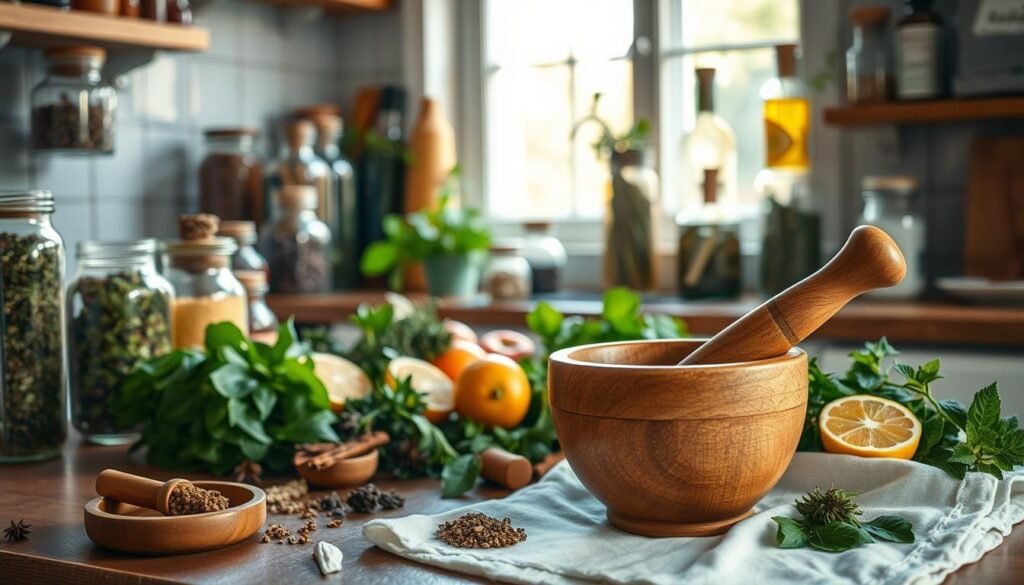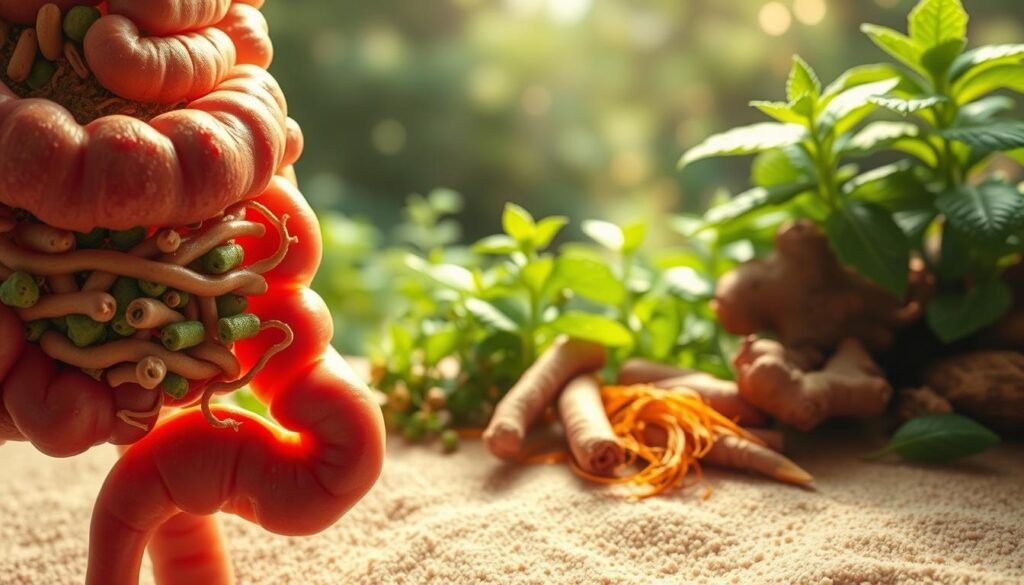Are you tired of relying on medication to soothe your digestive discomfort? Many individuals are turning to holistic approaches to support their overall well-being, particularly when it comes to maintaining a healthy gut.
With the growing interest in alternative health solutions, understanding how to utilize herbal remedies effectively can be a game-changer for those seeking a more natural approach to digestive health.
Key Takeaways
- Understanding the role of herbal remedies in supporting digestive health
- Exploring various natural herbs and supplements for gut health
- Learning how to prepare herbal remedies at home
- Discovering the benefits of a holistic approach to digestive well-being
- Identifying the best herbal remedies for common digestive issues
Understanding Digestive Health
Digestive health is a fundamental aspect of our overall health that is often overlooked until problems arise. It involves the proper functioning of the digestive system, which includes the breakdown and absorption of nutrients from food. A healthy digestive system is crucial for maintaining energy, supporting immune function, and overall well-being.
What is Digestive Health?
Digestive health refers to the optimal functioning of the digestive system, where food is properly broken down into nutrients that can be absorbed by the body. This process involves various organs, including the mouth, esophagus, stomach, small intestine, and large intestine, each playing a unique role. Good digestive health is characterized by regular bowel movements, minimal discomfort after eating, and the absence of chronic digestive disorders.
The Importance of Gut Health
Gut health is a critical component of digestive health, as it directly affects our ability to absorb nutrients and maintain a strong immune system. The gut microbiome, composed of trillions of microorganisms, plays a vital role in digestion, synthesizing certain vitamins, and protecting against harmful bacteria. Maintaining a balanced gut microbiome is essential for overall health and can be supported through a diet rich in fiber and the use of probiotics.
Common Digestive Issues
Many individuals experience digestive issues at some point in their lives, ranging from mild discomfort to chronic conditions. Common problems include irritable bowel syndrome (IBS), acid reflux, constipation, and diarrhea. These issues can be caused by a variety of factors, including diet, stress, and lifestyle choices, highlighting the need for a comprehensive approach to maintaining healthy digestion.
Natural Herbs that Promote Healthy Digestion
For centuries, certain herbs have been utilized to aid digestion and promote overall gut well-being. The use of these natural remedies has been passed down through generations, with many herbs being recognized for their efficacy in soothing digestive issues.
Ginger: Nature’s Digestive Aid
Ginger has been a staple in traditional medicine for its digestive benefits. It contains compounds like gingerol and shogaol, which help stimulate digestion and reduce nausea. Incorporating ginger into your diet can be as simple as making ginger tea or adding fresh ginger to your meals.
Peppermint: Soothing Your Stomach
Peppermint is another herb renowned for its ability to soothe digestive discomfort. The menthol in peppermint helps relax the muscles in the stomach, reducing symptoms of irritable bowel syndrome (IBS). Peppermint tea is a popular remedy for calming the digestive system.
Fennel: A Traditional Remedy
Fennel seeds have been used for centuries to aid digestion and reduce bloating. The active compounds in fennel help relax the gastrointestinal tract, making it easier to digest food. Fennel can be consumed as a tea or added to meals as a spice.
These natural herbs offer a gentle and effective way to promote healthy digestion. By incorporating them into your daily routine, you can potentially alleviate common digestive issues and enhance your overall gut health.
How Herbal Remedies Work for Digestive Issues
The use of herbal remedies for digestive issues is rooted in traditional practices, and modern science is now beginning to understand their mechanisms of action. Herbal remedies offer a natural and often effective way to manage digestive health, leveraging the healing properties of plants.
The Science Behind Herbal Healing
Herbal healing is based on the bioactive compounds found in plants, which can have anti-inflammatory, antimicrobial, and other beneficial effects on the digestive system. For instance, ginger contains compounds like gingerol, which have been shown to aid digestion by enhancing the activity of digestive enzymes.
The science behind herbal remedies involves understanding how these bioactive compounds interact with the body. Research has shown that certain herbs can modulate the gut microbiota, reduce inflammation, and improve the integrity of the gut lining. This can lead to improved digestion and a reduction in symptoms associated with digestive disorders.
Role of Herbs in Balancing Gut Flora
Gut flora plays a crucial role in digestive health, influencing everything from nutrient absorption to immune function. Herbs like peppermint and fennel have been found to have a positive impact on gut flora. They can help in balancing the gut microbiota, which is essential for healthy digestion.
By promoting a balanced gut flora, herbal remedies can help alleviate common digestive issues such as bloating, gas, and irregular bowel movements. Moreover, a healthy gut microbiome is linked to overall well-being, suggesting that herbal remedies can contribute to general health beyond just digestive health.
Dietary Changes to Enhance Digestive Health
Dietary adjustments can significantly impact digestive health, offering a natural pathway to improved gut function. By making informed choices about the foods we eat, we can support the health of our digestive system.
Incorporating Fiber-Rich Foods
Fiber plays a crucial role in maintaining healthy digestion. It helps to regulate bowel movements, preventing constipation and ensuring the smooth passage of food through the digestive system. Foods rich in fiber include fruits, vegetables, whole grains, and legumes. Incorporating these into your diet can have a positive impact on digestive health.
Fiber-rich foods not only support the digestive system but also contribute to overall health by helping to manage blood sugar levels and promote feelings of fullness, aiding in weight management.
- Fruits such as apples, bananas, and berries
- Vegetables like broccoli, carrots, and leafy greens
- Whole grains including brown rice, quinoa, and whole-wheat bread
- Legumes such as beans, lentils, and peas
Staying Hydrated for Better Digestion
Adequate hydration is essential for healthy digestion. Water helps to break down food in the stomach, making it easier for nutrients to be absorbed. It also prevents constipation by softening stool and promoting regular bowel movements.
Staying hydrated is simple and can be achieved by drinking plenty of water throughout the day. It’s also beneficial to consume hydrating foods like cucumbers, celery, and watermelon, which contribute to your overall fluid intake.
By combining a diet rich in fiber with adequate hydration, individuals can significantly enhance their digestive health, reducing the risk of common digestive issues and promoting overall well-being.
Lifestyle Habits That Support Digestive Health
Maintaining a healthy digestive system requires more than just the right diet; it demands a holistic approach to lifestyle habits. Our daily choices significantly impact our gut health, influencing our overall well-being.
Stress Management plays a crucial role in digestive health. Chronic stress can lead to digestive issues such as irritable bowel syndrome (IBS), acid reflux, and stomach ulcers. “Stress affects the gut’s function and can exacerbate existing conditions,” notes a study on stress and gastrointestinal health. Effective stress management techniques, including meditation, yoga, and deep breathing exercises, can help mitigate this impact.
The Impact of Stress on Digestion
Stress triggers the release of hormones like cortisol, which can slow digestion and cause discomfort. Managing stress through relaxation techniques can help regulate digestive processes. For instance, a regular meditation practice can reduce symptoms of IBS and improve gut motility.
Moreover, incorporating mindfulness into daily routines can enhance digestive health. Being mindful of eating habits, savoring food, and eating slowly can improve digestion and reduce stress-related digestive issues.
The Benefits of Regular Exercise
Regular physical activity is another critical lifestyle habit that supports digestive health. Exercise can enhance gut motility, improve circulation, and boost the immune system. Activities like walking, jogging, and cycling are excellent ways to promote digestive well-being.
As
“Regular exercise can help prevent digestive disorders and improve overall gut health,”
highlights the importance of physical activity in maintaining a healthy digestive system. A balanced lifestyle that includes regular exercise and stress management can significantly contribute toholistic healthandnatural healingprocesses.
By adopting these lifestyle habits, individuals can take a proactive approach to supporting their digestive health, ultimately enhancing their overall quality of life.
Preparing Herbal Remedies at Home
Preparing herbal remedies at home allows you to take control of your digestive health using natural ingredients. By using simple recipes and readily available herbs, you can create effective remedies that support your gut health. This approach not only empowers you to manage your digestive issues but also connects you with traditional practices of using nature’s bounty for well-being.
Quick Herbal Tea Recipes for Digestion
Herbal teas are a comforting and easy way to aid digestion. Here are a few simple recipes:
- Ginger Tea: Slice a small piece of fresh ginger and steep it in boiling water for 5-10 minutes. Strain and drink.
- Peppermint Tea: Steep a handful of dried peppermint leaves in hot water for 5-7 minutes. Strain and enjoy.
- Fennel Tea: Crush a teaspoon of fennel seeds and steep them in boiling water for 10 minutes. Strain before drinking.
Making Your Own Tinctures
Tinctures are concentrated herbal supplements that can be used to support digestive health. To make a tincture, you will need natural herbs, a solvent (usually alcohol or glycerin), and a jar.
Here’s a basic recipe:
- Fill a jar with your chosen herbal remedies.
- Cover the herbs with your solvent, ensuring they are completely submerged.
- Seal the jar and store it in a cool, dark place for 2-4 weeks, shaking it daily.
- Strain the liquid and store it in a dark glass bottle.
Here’s a comparison of different solvents used for making tinctures:
| Solvent | Properties | Best For |
|---|---|---|
| Alcohol | Preserves well, extracts a wide range of compounds | Herbs with resins and alkaloids |
| Glycerin | Sweet, suitable for children and those who avoid alcohol | Herbs with water-soluble compounds |
| Vinegar | Extracts minerals, adds a tangy flavor | Herbs rich in minerals |

Seeking Professional Guidance
Combining conventional healthcare with natural healing methods can lead to better digestive health outcomes. While herbal remedies offer numerous benefits, understanding when to seek professional guidance is crucial for comprehensive care.
When to Consult a Healthcare Provider
It’s essential to consult a healthcare provider if you experience persistent or severe digestive symptoms. Conditions such as chronic diarrhea, abdominal pain, or bloody stools require immediate medical attention. A healthcare provider can diagnose underlying conditions and recommend appropriate treatments, which may include herbal remedies as a complementary approach.
Red flags that necessitate medical consultation include:
- Unexplained weight loss
- Severe abdominal pain
- Bloody or black stools
- Chronic diarrhea or constipation
Integrative Approaches to Digestive Health
Integrative approaches combine the best of conventional medicine with evidence-based natural therapies. This holistic approach considers the whole person – body, mind, and spirit – in the treatment plan. For digestive health, this might include dietary changes, stress management, and targeted herbal supplements.
An integrative approach to digestive health might involve:
| Therapy Type | Description | Benefits |
|---|---|---|
| Dietary Changes | Personalized nutrition plans | Improved gut health, reduced symptoms |
| Stress Management | Mindfulness, meditation, yoga | Reduced stress, improved digestion |
| Herbal Supplements | Targeted use of herbs like ginger, peppermint | Relief from symptoms, improved gut health |
By integrating conventional healthcare with natural remedies and lifestyle changes, individuals can achieve a more comprehensive approach to managing digestive health.
Popular Herbal Supplements for Digestive Support
Herbal supplements have become a cornerstone in supporting digestive health, offering a natural approach to maintaining a healthy gut. These supplements can provide additional support for individuals looking to enhance their digestive well-being.
Reviewing Efficacy: Probiotics and Enzymes
Probiotics and enzymes are two of the most commonly used herbal supplements for digestive support. Probiotics are live bacteria and yeasts that are beneficial for gut health, aiding in digestion and reducing symptoms of irritable bowel syndrome (IBS). Enzymes, on the other hand, help break down food into smaller, more absorbable components, facilitating better nutrient uptake.
The efficacy of these supplements can vary based on the individual and the specific product used. It’s essential to choose high-quality products from reputable manufacturers to ensure efficacy.
- Lactobacillus and Bifidobacterium are strains of probiotics that have been shown to support gut health.
- Digestive enzymes such as amylase, lipase, and protease play crucial roles in carbohydrate, fat, and protein digestion.
The Role of Gut Health Supplements
Gut health supplements, including probiotics and prebiotics, play a significant role in maintaining a balanced gut microbiome. Prebiotics serve as food for probiotics, helping them thrive and support a healthy digestive system.
The combination of probiotics and prebiotics, known as synbiotics, can enhance the survival and activity of beneficial bacteria in the gut.
When selecting gut health supplements, it’s crucial to consider the specific needs of your digestive system and consult with a healthcare professional to determine the best course of action.
Essential Lifestyle Tips for Gut Health
Achieving optimal gut health requires a holistic approach that goes beyond diet. It involves adopting certain lifestyle habits that can significantly impact your digestive wellness. By incorporating mindful eating practices and maintaining a consistent sleep routine, you can enhance your gut health and overall well-being.
Mindful Eating Practices
Mindful eating is about being fully present while eating, savoring each bite, and paying attention to the taste, texture, and smell of your food. This practice can help reduce stress and improve digestion. As Dr. Jon Kabat-Zinn, a renowned mindfulness expert, once said,
“The best way to take care of the future is to take care of the present moment.”
Mindful eating encourages you to listen to your body’s hunger and fullness cues, eating slowly, and stopping when you’re satisfied, rather than stuffed.

- Eating without distractions like TV or smartphones
- Chewing your food thoroughly
- Savoring the flavors and textures
- Paying attention to hunger and fullness signals
By adopting these habits, you can create a healthier relationship with food and improve your gut health.
Maintaining a Sleep Routine
Maintaining a consistent sleep routine is crucial for gut health. Research has shown that there is a significant link between sleep patterns and the gut microbiome. Adequate sleep helps regulate the balance of gut bacteria, which is essential for proper digestion and overall health.
To maintain a healthy sleep routine:
- Establish a regular sleep schedule
- Create a bedtime routine that promotes relaxation
- Avoid caffeine and electronics before bedtime
As Harvard Health Publishing notes, “Sleep is essential for a healthy gut, as it affects the balance of the gut microbiome.” Prioritizing sleep is, therefore, a critical aspect of maintaining gut health.
Addressing Food Intolerances Naturally
Identifying and managing food intolerances is crucial for maintaining optimal digestive health. Food intolerances occur when the body has difficulty digesting certain foods, leading to uncomfortable symptoms. Unlike food allergies, which trigger an immune response, intolerances are generally related to the digestive system’s inability to process certain foods properly.
Identifying Common Intolerances
Common food intolerances include lactose intolerance, gluten intolerance, and intolerance to certain food additives. Symptoms can range from bloating and gas to abdominal pain and diarrhea. Keeping a food diary can help identify patterns and potential intolerances.
Lactose intolerance is a condition where the body lacks the enzyme lactase, needed to digest lactose, a sugar found in milk and other dairy products. Gluten intolerance, on the other hand, involves sensitivity to gluten, a protein found in wheat, barley, and rye.
Herbal Solutions for Food Sensitivities
Herbal remedies can provide relief for individuals dealing with food intolerances. Certain herbs have anti-inflammatory properties and can soothe the digestive tract.
- Ginger: Known for its anti-inflammatory properties, ginger can help reduce nausea and inflammation.
- Peppermint: Peppermint oil capsules can ease digestive discomfort and reduce symptoms of irritable bowel syndrome (IBS).
- Turmeric: Curcumin, a compound in turmeric, has potent anti-inflammatory and antioxidant properties.
“Herbal remedies offer a natural approach to managing food intolerances, providing relief without the side effects often associated with conventional medications.”
By incorporating these herbal solutions into their diet, individuals can better manage their food intolerances and improve their overall digestive health.
Case Studies: Success Stories with Herbal Remedies
The effectiveness of herbal remedies in enhancing gut health is evident through numerous success stories. Individuals from various backgrounds have turned to these natural solutions to address their digestive issues, often with remarkable results. This section highlights real-life case studies that demonstrate the potential of herbal remedies in improving gut health.
Real-Life Results: Patients Who Improved Their Gut Health
Several case studies illustrate the positive impact of herbal remedies on digestive health. For instance, a patient suffering from chronic IBS found significant relief after incorporating peppermint oil into their daily routine. Another individual, who had been experiencing persistent bloating, reported a substantial reduction in symptoms after using ginger supplements.
“After starting a regimen of herbal teas, including peppermint and chamomile, I noticed a significant decrease in my IBS symptoms. It’s been a game-changer for my digestive health.” – Emily, age 32
A study conducted over three months with a group of 20 participants showed that 75% of those who used fennel seeds as a digestive aid reported improved digestion and reduced symptoms of indigestion.
| Herbal Remedy | Condition Treated | Success Rate |
|---|---|---|
| Peppermint Oil | IBS | 80% |
| Ginger Supplements | Bloating | 70% |
| Fennel Seeds | Indigestion | 75% |
Lessons Learned from Herbal Healing
The success stories and case studies provide valuable insights into the effectiveness of herbal remedies. One key lesson is the importance of patience and consistency when using these natural treatments. Unlike conventional medications that may offer quick fixes, herbal remedies often require a longer period to demonstrate their full benefits.
Another crucial lesson is the need for personalized approaches. What works for one individual may not work for another, highlighting the importance of tailoring herbal remedies to the specific needs of each person.
Future Trends in Digestive Health Remedies
The landscape of digestive health is evolving, with a growing focus on natural and holistic approaches. As research continues to uncover the complexities of gut health, new trends are emerging that promise to revolutionize the way we manage digestive issues.
Advancements in Herbal Medicine
Innovations in herbal treatments are at the forefront of this shift. Scientists are exploring the potential of various natural herbs to create more effective herbal supplements. These advancements are expected to enhance the efficacy of traditional remedies, offering improved relief for digestive discomfort.
Personalized Nutrition for Optimal Gut Health
Another significant trend is the growing popularity of personalized nutrition. By tailoring dietary recommendations to an individual’s unique gut microbiome, healthcare providers can offer targeted solutions for achieving optimal digestive health. This approach represents a significant step forward in holistic health, leveraging the latest research to promote overall well-being.
As these trends continue to gain momentum, they are likely to shape the future of digestive health remedies, providing new opportunities for those seeking natural and effective solutions.



